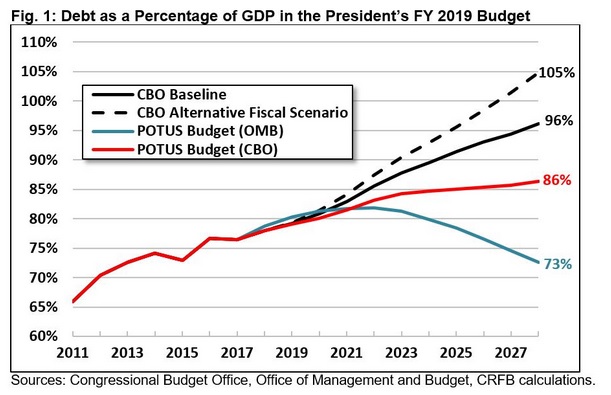Trump's Budget Only Reduces the Deficit If You Accept Some Very Unlikely Assumptions
The really scary thing is that even the CBO's more accurate assessment is also based on unlikely assumptions.

The Trump administration says its budget proposal would cut the annual deficit to about $360 billion over the next 10 years, thanks to booming economic growth and the highly unlikely slashing of domestic spending.
Using more realistic expectations, a new report from the Congressional Budget Office (CBO) shows that debts and deficits will continue to grow even if Congress implemented President Donald Trump's proposal wholesale. Trillion-dollar deficits will hit by 2022, according to the CBO, and deficits would total about $9.5 trillion over the next decade, up from the $7.2 trillion that the White House says would be added to the debt by 2028.
The White House projects about 3 percent growth for the next decade, while the CBO expects only about 1.8 percent. That accounts for the "vast majority of the difference in debt estimates," according to the Committee for a Responsible Federal Budget, a nonpartisan think tank that favors reducing the deficit. The group released its own analysis of the CBO's analysis on Friday.
The CBO's assessment is an attempt to estimate what would happen if Trump's budget plan went into effect, even though it's virtually certain that that it won't. That leads it to a variety of unlikely assumptions.
For example, the CBO assumes that Trump will be successful in cutting more than $1.5 trillion in non-defense discretionary spending, along with another $1 trillion cut from health care spending (mostly in the form of a still-unclear plan to repeal the Affordable Care Act and make unrelated changes to Medicare), and that the administration will cut more than $300 billion from other social welfare programs like food stamps. All those those spending reductions are politically unpalatable and therefore likely to be ignored by Congress, but even if they all happen, the debt would still increase, the CBO says.
"The budget relies on huge cuts to non-discretionary programs that run counter to the large spending increases the President signed into law earlier this year," the CRFB report concludes. "In addition, these changes simply are not sufficient when using realistic economic growth assumptions."
Still, Trump's budget is an improvement on the national debt's current trajectory. Without any policy changes, the CBO projects the deficit would hit $1.5 trillion by 2028.

Like most presidential budgets, there's little reason to think that the spending framework sent months ago from the White House to Congress will ever become law. When it comes to budget-making, Congress does what it wants.
But that doesn't mean a presidential budget is meaningless. It's a part, even if only a small part, of a continuously ongoing conversation about America's spending priorities and long-term fiscal plan. And given how unhappy Trump was about Congress' decision to dump a record-breaking spending bill on his desk in March—"I will never sign a bill like this again," Trump said as he signed the bill that essentially guaranteed $1 trillion annual deficits for the rest of his term—the budget presented to Congress in February, which was subjected to hearings this week, could be seen as a signal from the administration that runaway spending will no longer be tolerated.
It could be that. But only if you buy into the White House's overly rosy assumptions, and believe that Congress will suddenly decide to cut billions from entitlement programs, the military, and other politically sacrosanct line items. In other words, it ain't happening.


Show Comments (21)